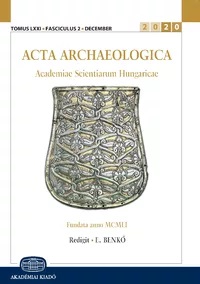Late antique Mediterranean rotary keys from Avaria
Late antique Mediterranean rotary keys from Avaria
Author(s): Ádám BollókSubject(s): Archaeology, Ancient World
Published by: Akadémiai Kiadó
Keywords: rotary key; late antique; Avar period; Carpathian Basin; Mediterranean
Summary/Abstract: The present paper describes and discusses a group of iron and copper-alloy rotary keys characterised by a moveable joint connecting the shaft and the key-ring, appearing in the seventh-century material record of the Carpathian Basin whose origins can be sought in the Mediterranean. While the few published examples of the class were in previous studies mainly regarded as Roman-period artefacts secondarily re-used as amulets by the Avar-period population of the Carpathian Basin, the present study argues that these pieces in fact have a sixth-to seventh-century production date, being thereby contemporaneous with their deposition in seventh-century mortuary assemblages. Taking this observation as a springboard for further interpretation, an overview of the possible meanings and symbolic associations attached to keys in Roman, late antique, and early medieval times is offered. The main argument presented here is that besides serving amuletic purposes, some of the Avar-period keys could in all probability have conveyed more explicit messages about their owners, such as that of their feminity and of their economic role and authority in their respective households. The Appendix supplementing the present paper seeks to provide a theoretical reconstruction of a wooden casket buried with the woman interred in Grave 119 of the Kölked-Feketekapu B cemetery, one of the burials yielding a Mediterranean hinged rotary key.
Journal: Acta Archaeologica Academiae Scientiarum Hungaricae
- Issue Year: 74/2023
- Issue No: 1
- Page Range: 99-119
- Page Count: 21
- Language: English

